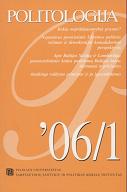Nepastovus posovietinės Ukrainos politinės režimas ir demokratijos konsolidavimo perspektyvos
Permanently Fluctuating Political Regime of Post-Soviet Ukraine and the Prospects of Democracy Consolidation
Author(s): Živilė ŠatūnienėSubject(s): Politics / Political Sciences
Published by: Vilniaus universiteto leidykla & VU Tarptautinių santykių ir politikos mokslų institutas
Summary/Abstract: The main question examined in this article is whether the vacillation of Ukraine’s political regime is not a regular, permanent condition. Having two main aims – (1) to construct a theory of Ukraine’s post-soviet political transformation, and (2) to disclose the possibilities of democracy consolidation in this country – the article starts with making some “corrections” to the transitologist approach to regime change. Then it proceeds with the proposal of model for analysing post-soviet regime transformations. The model consists of three main explanatory variables: (1) the structure of political elite, (2) the ‘rules of game’ prevalent in the system, and (3) the strategies of political elite aiming at gaining business and/or mass support. Various interrelations of these variables may produce four possible ideal-type outcomes of regime change – (1) democracy, (2) ‘democracy with adjectives’, (3) zero-sum game (a very unstable option when political regime may be temporarily democratic but is at a huge risk of downfall), (4) authoritarianism. The article predicts that due to the structural peculiarities of Ukraine the zero-sum game will remain very intensive in Ukraine in the future as well. Thus, the permanent instability of the state and both – democracy and authoritarianism – in Ukraine (a zero-sum game) may actually be considered to be its consolidated political regime form.
Journal: Politologija
- Issue Year: 2006
- Issue No: 1(41)
- Page Range: 28-70
- Page Count: 43
- Language: Lithuanian

